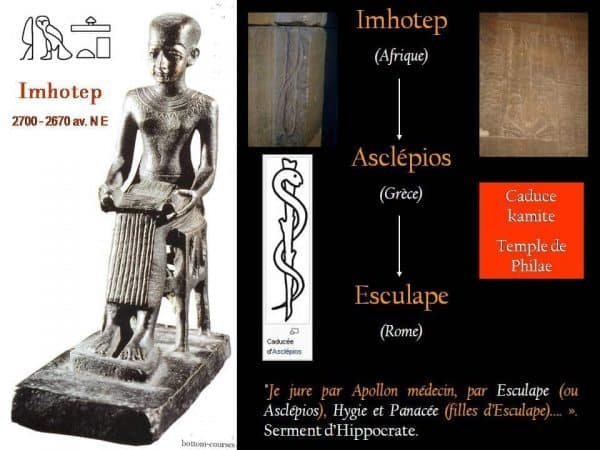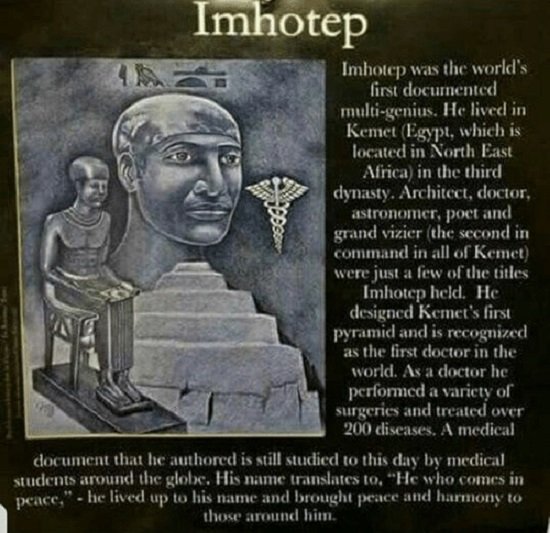This piece of work is by the courtesy of https://www.healio.com/news/pediatrics/20141203/imhotep-the-real-father-of-medicine-an-iconoclastic-view & https://www.ancient.eu/imhotep/
Near the beginning of the Bronze Age, the third dynasty of ancient Egypt began, which was the first dynasty of the “Old Kingdom” (2686 B.C. to 2181 B.C.). Also, the pharaoh Djoser came to power (circa 2670 B.C.) and ruled for about 19 to 29 years. The exact duration, like many other facts, remains debatable by historians. As with most historic information of ancient Egypt, it is almost all derived from archeological artifacts, hieroglyphics, a few written documents such as the Edwin Smith Papyrus, and conjecture.
During this time, a commoner named Imhotep came to prominence (circa 2650 B.C. to 2600 B.C.), ultimately becoming the chancellor/advisor to Djoser through his talents as scribe, architect, engineer, artist, as well as his knowledge of medicine. Remarkable for the time was that his medical teachings were among the first not completely driven by magic or mysticism. Supposedly, Imhotep had some knowledge of anatomy and medical treatments derived from plants. It has been suggested that it was actually Imhotep who wrote the document from which the Edwin Smith Papyrus was derived. If that were true, the question of his status as physician would not be debatable, but unfortunately, confirmatory evidence simply does not exist.

Nonetheless, Imhotep’s influence in life was justifiably strong, growing even stronger after death. So much so that 2,000 years later his status was ultimately elevated to that of a deity of medicine, with his cult centered in Memphis, the capital of ancient Egypt. After his deification, Imhotep was considered the mortal path to the god Ptah, god of creation and fertility, who was supposedly the father of Imhotep. There are some striking parallels in the ascension of Imhotep and that of the Greek god, Asclepius, who also had an earthly beginning, and whose father was supposedly the god Apollo.
In light of all the above, in 1928, William Osler proposed that Imhotep was the “real father of medicine” — not Hippocrates. Osler eloquently stated that Imhotep was “the first figure of a physician to stand out clearly from the mist of antiquity.” However, the mist may have been a bit too thick to see with that much clarity, as this notion is being increasingly questioned as more myth than fact. There appears to be no direct evidence that Imhotep was actually considered a “physician” at all, but rather a wise and well-educated man of many talents (polymath), as noted above, including the design of the first pyramid, the pyramid of Djoser, in an area of Egypt called Saqqara. He went on to design other pyramids, including his own burial site in an unknown location in Saqqara.

In ancient Egypt, the word for physician was “swnw”, which became prominent along with the name of one who practiced medicine. However, this title was never seen with Imhotep’s name, as it was with other physicians of that time, according to a review by Guenter B. Risse, MD, PhD, from the department of history of health sciences of the University of California, San Francisco. Some consider Hesy-Ra to be the first true physician. He lived during the same time as Imhotep, held the title of “swnw” and served under the same ruler, Djoser, with the rank of chief of dentists and physicians.
However, all mythology aside, common sense calls into question whether anyone from that era would fit a broadly-accepted definition of a physician. It becomes a matter of how refined the definition of physician might be. Surely there were individuals well before Imhotep who tried to help the sick and injured as a vocation, but perhaps mixed in a tincture of religion and a dose of mysticism with their services. I’ll admit that this too is only conjecture on my part.

At the very least, we should accept the uncertainties of facts that are carried forward for several thousand years without clearly written documentation. Sometimes it is hard enough to keep the facts accurate when passed from person to person, or generation to generation, let alone from one millennia to the next.
Additionally, when a person is so popular in life they commonly become even more significant in death. You can probably think of a few examples of this in our time (mostly entertainers), as it is a common phenomenon. Therefore, with so much speculation, can we ever really know who the “Father of Medicine” was? It would be nice to know, but does it really matter? In my opinion, the first “true practicing physician,” was likely someone much more obscure, of whom no records exist. Imhotep, Hesy-Ra, and other more public figures are more likely to have the notoriety that results in some historic documentation, and therefore be remembered. It then becomes a matter of accuracy. We all have a human desire to know who was the first, the last, the largest, the smallest, the worst, and the best. However, some of the best physicians I have known over my 37 years in this business practice quietly, in relative obscurity compared to the few that are more narcissistic, who seem to strive to be “newsworthy,” with no more compassion or qualification. Would that make them less a “father” or mother of medicine?